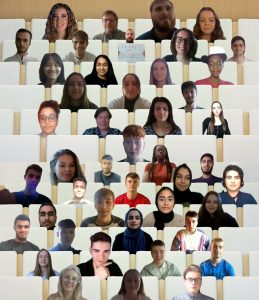The University of Kent’s Professional Economics Degree Apprenticeship Programme has been named as runner up in the Widening Access and Outreach category of the Guardian University Awards 2020.
In 2018, Kent and the Government Economic Service (GES) launched the Professional Economics Degree Apprenticeship programme with the aim of attracting a diverse new generation of economists into the profession and into the Civil Service. The project was jointly-led by the University’s Centre for Higher and Degree Apprenticeships (now Digital and Lifelong Learning) and the School of Economics, exclusive providers of the Professional Economist Apprenticeship to GES.
The project has already yielded a first and second cohort of apprentice drawn from diverse backgrounds. These apprentices are already actively engaged in developing and setting policy, representing their communities that will shaping UK society for years to come.
Between 7 and 18 September 2020, the second cohort of 64 apprentices from the GES, the Civil Aviation Authority, the Bank of England, Jacobs, Ofcom, and Hastings Direct all took part in a Virtual Starter Fortnight, introducing them to the apprenticeship and the profession.

The apprenticeship aligns with Kent’s 2025 Strategy to develop the civic role of the University and enhance access via apprenticeships, as well as Kent’s long-standing commitment to widening access and excellence in outreach, and reflects GES’ 2020 strategy’s diversity commitments.
Professor Alastair Bailey and Dr John Pearson of the School of Economics at the University of Kent comment that:
“Economics has not always been the most diverse profession so to be able to work with the highest profile and largest employers of economists in the UK with the aim of attracting diversity is a privilege. It has been a joy to see our apprentices already making a real difference in bodies responsible for a wide range of public and private sector policy. None of this could have happened without the efforts of many but significant credit should be given to Lauren Frake and Catherine Tate alongside our effective partnership with GES and employer colleagues.”

